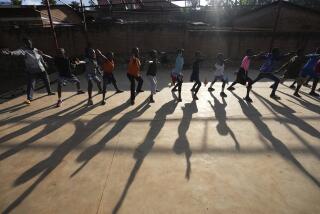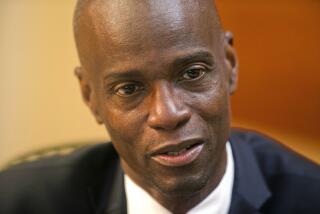Ex-Rwanda Official Arrested
PARIS — The former head of Rwanda’s military police, accused of a leading role in planning and executing one of the greatest horrors of modern times--the mass murder of more than 800,000 men, women and children in his Central African nation--has been arrested in Belgium, authorities in that country announced Tuesday.
Augustin Ndindiliyimana, a former lieutenant colonel who headed Rwanda’s Gendarmerie Nationale, was in custody after being detained in a town northwest of Brussels, a spokeswoman for Belgium’s Justice Ministry said.
The U.N.-created International Criminal Tribunal for Rwanda had indicted the former military official Friday and issued a warrant for his arrest on charges of genocide, complicity in genocide and crimes against humanity.
According to Kingsley Moghalu, a spokesman for the tribunal, Ndindiliyimana is believed to have played a central role in drawing up the blueprint to exterminate members of the Tutsi ethnic group--about 15% of Rwanda’s population--as well as political opponents of the extremist government led by Hutus.
As former chief of staff of the Gendarmerie Nationale, he is specifically accused of holding meetings with leading officials in the government and military to plan the massacres. The genocide began April 7, 1994, after Rwanda’s Hutu president, Gen. Juvenal Habyarimana, was killed in a plane crash.
The Tutsi and moderate Hutu victims of the genocide were methodically slaughtered by Hutu soldiers and militias. Many were hacked to death with machetes.
Moghalu said Ndindiliyimana was also charged in the killings of 10 Belgian peacekeepers who were guarding the country’s prime minister, Agathe Uwilingiyimana, when the killing began. He is alleged to have been aware that the Belgian soldiers were being beaten to death by their Rwandan counterparts but to have done nothing to stop it.
The genocide in Rwanda marked the most abject failure of U.N. peacekeeping operations to date. In December, U.N. Secretary-General Kofi Annan, who was head of U.N. peacekeeping at the time of the massacres, accepted responsibility and apologized to the Rwandans.
“Of all my aims as a secretary-general,” Annan said in a statement, “there is none to which I feel more deeply committed than that of enabling the United Nations never again to fail in protecting a civilian population from genocide or mass slaughter.”
Despite his alleged offenses, Ndindiliyimana may have enjoyed high-level support in the Belgian military. According to Gasana Ndoba, president of Rwanda’s national human rights commission, it was Belgian officers who subsequently shielded the Hutu official.
Ndindiliyimana reportedly fled to Zaire, now Congo, after the genocide and from there traveled to Belgium, where he was granted refugee status in May 1998.
“We have reconstructed the itinerary that led him to Belgium after the genocide, and we know that several high-ranking Belgian officers, at least colonels, helped him arrive in Belgium and to obtain refugee status,” Ndoba said in the Rwandan capital, Kigali, on Tuesday.
In May 1996, Belgium’s commission of refugees originally refused asylum to the Rwandan, citing “serious reasons to think that the subject committed crimes against humanity.” But a review panel overturned the ruling two years later.
Rosanne Germonprez, spokeswoman for the Belgian Justice Ministry, said Ndindiliyimana was arrested Friday in Termonde. According to the Belgian daily newspaper La Libre Belgique, he was detained at his home.
Germonprez said the court in the Belgian town now has three months to rule on an extradition request to send the Rwandan to the U.N. tribunal, which is based in the northern Tanzanian town of Arusha.
Ndindiliyimana also served as President Habyarimana’s top national security advisor. A member of the president’s National Republican Movement for Democracy and Development, he was so trusted by Habyarimana that in December 1991, the extremist Hutu leader relinquished the defense portfolio that he had held for himself since 1965 and gave it to Ndindiliyimana.
More to Read
Sign up for Essential California
The most important California stories and recommendations in your inbox every morning.
You may occasionally receive promotional content from the Los Angeles Times.









